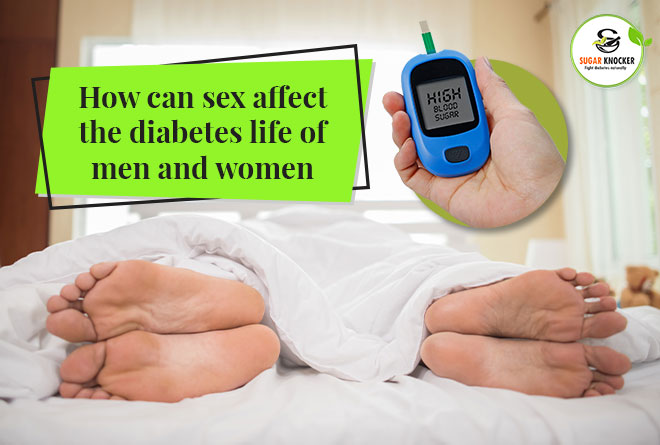
Sexual problems in diabetics : When you have a chronic illness, sex can often take a back seat. Healthy sexuality and sexual expression, on the other hand, are at the forefront when it comes to sustaining one’s quality of life, regardless of other issues.
Diabetes has far-reaching consequences that go beyond a person’s diet. It has the potential to affect every part of their lives, especially their sexual well-being. When a person develops diabetes, their body is unable to effectively utilize insulin, resulting in elevated blood sugar levels.
These can lead to concerns including nerve damage and cardiovascular issues over time. Both of which have sexual health concerns.
Sexual Health issues

People are terribly bashful about sex when it comes to our health, despite being an oversexed culture that isn’t hesitant to push limits on TV, in films, on the radio, and in books and magazines.
Despite the fact diabetes sex problems are more likely to grow every day, according to research published in Diabetes Care, only approximately half of all men with diabetes and 19 percent of women with diabetes had discussed the issue with their doctor.
And to be honest, many doctors are hesitant to question patients about their sexual function. This is why people who are newly diagnosed with diabetes learn fast about their risk of eye, nerve, kidney, and heart concerns, but they seldom hear about how diabetes impacts sexual health.
It’s critical for patients to be upfront and honest with their doctors about any health concerns they have, including sexual function issues. Sexual performance and satisfaction concerns might be an indication of underlying health problems.
For example, erectile dysfunction in diabetes many men with erectile problems eventually discover they have diabetes. Sexual problems in diabetics might signal nerve damage, clogged arteries, and sometimes even out-of-whack hormones.
Despite the fact that there is still much to understand about sexual problems in diabetics, experts are positive of one thing: Many sexual difficulties are caused by chronic high blood glucose (or blood sugar), and the first line of treatment is to improve glucose management.
What Exactly Is The Problem with Low Libido?

Low libido, or sexual drive, is a serious condition that affects diabetics more than non-diabetics. Low libido affects both men and women as a result of poorly controlled diabetes. If your sex desire has halted, start by addressing your diabetes and taking efforts to decrease your blood glucose levels. Then think about your prescriptions.
Inflammation, according to researchers, may also reduce desire. Because sexual desire is a brain-driven phenomenon, it’s possible that inflammatory chemicals will breach the blood-brain barrier and circulate in the area where sexual desire exists. Another factor to consider is low testosterone, which is a common Sexual problems in diabetics and is often seen in diabetic men and women.
Libido in Men

Men with diabetes, particularly those with type 2 or who are obese, or both, have nearly double the chance of low testosterone as those who do not have the condition, which can influence a man’s lust for sex. Many men have a revived desire for sex after treating low testosterone with weight loss and/or testosterone treatment.
Libido in Women

Women are more difficult to treat. Also, it’s difficult for experts to tell if a woman’s low libido is caused by diabetes, mental concerns, or something else completely because low libido is common among women irrespective of diabetes.
Treatment Options for Men

Maintaining good blood glucose levels is critical in preventing nerve damage, which can lead to a variety of issues, such as sexual health issues. Using insulin, taking medicines, and testing blood glucose levels on a regular basis are all ways to manage blood sugar levels.
Men’s treatment choices for Sexual problems in diabetics
A doctor can prescribe a variety of drugs to boost blood flow and a man’s ability to develop an erection.
Sildenafil (Viagra), tadalafil (Cialis), vardenafil (Levitra), and avanafil (Avanafil) are only a few examples.
These drugs, however, may not be appropriate for all men, especially those who have high blood pressure or heart problems. Vacuum pumps and injections into the penis may be useful for some guys. Some men get surgery to help them obtain an erection, such as a penile implant.
Women’s treatment choices for Sexual problems in diabetics

To lessen discomfort during intercourse, women may choose to apply vaginal lubrication before participating in sex. Water should be used as lubrication.
The use of hormone replacement therapy
Hormone replacement therapy can boost both men’s and women’s sexual drive. These therapies, however, can have adverse effects, so patients should talk to their doctors about them before starting to take any drugs. According to a 2016 study; it is still unclear how hormone treatment affects an individual’s insulin sensitivity, particularly during menopause.
How to Prevent Diabetes from Spoiling Your Sex Life

Your sex life might not be where it should be as a result of diabetes sex problems. You’ve already won half the battle if you can acknowledge it to your health care practitioner. Getting your blood glucose into your goal range may help you experience improvements depending on the severity of your sexual dysfunction.
Even if the effects are too severe to be reversed by better diabetes management simply, maintaining a healthy blood glucose level can help avoid future harm. Another suggestion is to stop smoking. It has been related to sexual issues and is terrible news for the rest of your body.
Men and women can benefit from a variety of treatments, including contacting a doctor who specializes in sexual medicine and speaking with a mental health specialist. Since relationship concerns, bodily issues, stress, and a slew of other emotional baggage may impact all parts of your sexual life, the latter is crucial.
You can be too self-conscious or anxious to get in the mood or aroused, or you might be too pressured to have an orgasm.
A counselor can also assist you and your spouse in resolving any issues that have arisen as a result of your sexual dysfunction. It causes such emotional stress in a relationship that it can spread across the entire partnership, not just in the bedroom. So, talk it out and see what you can come up with.
The following are some suggestions:
- consuming a nutritious diet
- Regular exercise is essential for keeping a healthy weight.
- These habits are beneficial to one’s general health and can boost one’s self-esteem.
Exercises for the pelvic floor

Researchers claimed in 2017 that sex education and pelvic floor muscle exercises, often known as Kegel exercises, might increase a woman’s physical desire after menopause.
To identify and train the muscles, follow these basic instructions:
Sit on the toilet and try to halt a stream of pee to identify the pelvic floor muscles. Alternatively, place a finger in the vaginal canal and compress the vaginal muscles around it. These are the muscles that need to be targeted.
Tighten the muscles and keep them in place. Begin by gripping the muscles for 3 seconds and then releasing them for the same amount of time. If feasible, repeat the exercise 10 times in succession.
Increase the amount of time the muscles are tightened from 3 seconds to 5 seconds by repeating the exercises at least twice a day.
Men may undertake Kegel exercises as well, and they may find that they enhance their command over ejaculation and minimize incontinence.
Stress reduction

People with diabetes may discover that stress-reduction techniques are beneficial. These are some examples of these practices:
- meditating
- reading
- working out
- listening to music
People with diabetes can benefit from taking even a short amount of time during the day to do something pleasurable. Maintaining good overall health is essential for a fulfilling sexual life.
This involves maintaining normal blood sugar levels for patients with diabetes to avoid diabetes sex problems. Sex is similar to exercise in that it expends energy, so keep an eye on your blood sugar levels.
Hypoglycemia (low blood sugar) can occur during sex if you’re taking medications that boost the amount of insulin in your body. Before participating in sexual activity, check your blood glucose levels. Remember that whatever is healthy for your heart is also excellent for your genitals.
Blood flow plays a role in sexual stimulation, vaginal lubrication, and erection. Maintain a healthy heart and normal blood circulation by living a healthy lifestyle. This involves exercising on a regular basis. Exercise can also help you feel more energized, have a better mood, and have a better body image.
Consulting a doctor
Contact your endocrinologist or doctor if you have any concerns or questions regarding your sexual health if you have diabetes.
Relevant questions that can be asked are:
- What information do I require in order to effectively manage my diabetes?
- What other medical issues do I have that might be interfering with my sexual health?
- What drugs do I take that could be interfering with my sexual life?
A doctor may also suggest that you consult a counselor or therapist to assist you to enhance your self-esteem and self-perception. Couples counseling can also be effective.
Sexual dysfunction might indicate illness progression or a failure of therapy.
Don’t be hesitant to bring up the topic of medication’s sexual adverse effects. Inquire if there are any drugs that don’t have the same adverse consequences as the others.
Also, feel free to inquire about ED medications. Penile pumps may be an alternative if you aren’t a suitable candidate for ED medicines. Patients and clinicians should be aware that most middle-aged and older persons with companions are still sexually active regardless of their diabetes, and that many individuals with diabetes have untreated sexual issues leading to diabetes sex problems, necessitating consultation with a doctor.
Nearly half of the women in the study’s age group had no sexual partners, and women with diabetes are substantially less prone to have a partner than women without diabetes. Those who have partners are much more likely than men to abstain from sex because of a condition, and they are considerably less likely than men to go to their doctors about a sexual problem.
Based on blood testing, the researchers discovered that:
Diabetes affected 47 percent of men. The condition was found in 22% of those who had never been diagnosed before. Nearly 40% of the women had diabetes, with 20.5 percent having been diagnosed and 19 percent having never been diagnosed.
The results are comparable to earlier studies of adults over the age of 60, according to the researchers, and are in line with the estimates of 12 million people with diabetes. According to the researchers, nothing has really been known about sexuality among individuals with uncontrolled diabetes, who are often in the early stages of the disease and are unaware that they have it.
Individuals are protected from the psychological stress and shame associated with diabetes if they are unaware of their diagnosis. The fact that orgasm problems are more common in persons who aren’t diabetic shows that they’re mostly physical. The “psychological weight” associated with the condition may contribute to erectile dysfunction and a lack of desire in sex in men with a diagnosis.
According to the study, 60% of men without diabetes had masturbated in the previous 12 months, while just 47% of men had been diagnosed or had diabetes but didn’t realize it.
Only 22.5 percent of women reported masturbating in the previous year, according to the study. Only 15% of women with diabetes, whether identified or not, did so, compared to 29 percent of women without the illness.
Women and men with diabetes, whether diagnosed or undiagnosed, reported a greater frequency of orgasm problems. Whatever treatment options are chosen, a person with diabetes should never feel guilty or humiliated if their sexual function is affected.
Reaching out to a trustworthy healthcare expert and having an open, honest conversation with a partner can be the first steps toward a healthy life in general and a better sex life in particular.
